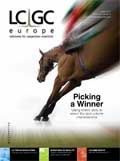Event News
Event News
HPLC 2011 Dalian
The HPLC symposium series is one of the premier conferences for liquid phase separations and related techniques. The conference has grown to become one of the largest meetings in the world dedicated to liquid phase separation science. This international meeting is multi-disciplinary and brings together many of the world's leading authorities to address the practical and economic aspects of separation science, as well as the challenges that lie ahead.

The 37th International Symposium on High Performance Liquid Phase Separations and Related Techniques (HPLC 2011 Dalian) will be held on 8–11 October 2011 in Dalian, China. The conference will take place at the Dalian World Expo Centre, Dalian, China, an exhibition hall which integrates services for exhibition, conference and performance.
HPLC 2011 Dalian will be comprised of plenary and keynote lectures, oral lectures, prominently featured poster presentations, and a comprehensive display of commercial products for separation scientists. The symposium will cover advances in all areas of liquid phase separations.
Currently more than 40 specially invited speakers from abroad have been confirmed, as well as more than 35 from mainland China and 5 from Taiwan. A list of prominent invited speakers can be found on the conference website.
Topics for HPLC 2011 Dalian will include Theory of Separation Science, featuring theoretical models and insights and data analysis and chemometrics; Advances in Liquid Phase Separation Technology, featuring column technology and stationary phases, monoliths and small particle technology, ultra-high pressure and high temperature chromatography, sample preparation methods and hyphenated separations such as LC–MS, CE–MS, LC–NMR and other hyphenated techniques; Applications in Life Sciences and Drug Discovery, featuring metabolomics, proteomics, glycomics, biomarker discovery and validation and pharmaceutical separations and analysis; and Other Applications, featuring food safety, environmental and agricultural analysis and polymer analysis.
Young scientists (under the age of 35) are encouraged to submit abstract for inclusion in the oral programme, and those that do can be considered for the PSC (Permanent Scientific Committee of HPLC Symposium) Young Scientist Award.
PSC Young Scientist Award aims to encourage the participation of young scientists in the HPLC symposium series and to recognise their contribution to the meeting.
In order to help the presence of young scientists to attend the HPLC 2011 Dalian symposium, travel awards sponsored by HPLC will be presented to students who will present either an oral or poster contribution at the symposium
For more information visit the website at www.hplc2011.dicp.ac.cn, e-mail hxl8110@126.com or contact Profesor Dr Guowang Xu, Co-Chairman of HPLC 2011 Dalian, National Chromatographic R. & A. Center, Dalian Institute of Chemical Physics, The Chinese Academy of Sciences, Dalian 116023, China. Telephone: +86 411 84379530 or Fax: +86 411 84379559.
21–25 August 2011
Dioxin 2011
Crowne Plaza, Brussels, Belgium
Tel: +32 2 739 3028
Fax: +32 3 743 1550
E-mail:dioxin2011@mci-group.com
Website: www.dioxin2011.org
5–9 September 2011
The 17th International Symposium on Separation Sciences (17-ISSS)
Hal of Grand Hotel Napoca, ClujNapoca, Romania
Tel: +40 264 55 11 75
Fax: +40 264 55 11 75
E-mail: 17isss-secretariat@event-consulting.ro
Website: www.17issscluj2011.org
19–21 September 2011
Advanced Analytical Methodologies in Drug Discovery (SSPA 2011)
Pavia, Italy
Tel: +39 0382 987174
Fax: +39 0382 422975
E-mail:sspa2011@scpaweb.org
Website: www.scpaweb.org
29 September 2011
Seminar Biobanking
World Trade Center, Stockholm, Sweden
Tel: +46 (0)8 723 50 08
Fax: +46 (0)8 205 511
E-mail: jenny.hagberg@lakemedelakademin.se
Website: www.lakemedelsakademin.se
10–12 October 2011
International Symposium of AOAC Europe Section: Quality Control of Botanicals, TCM, Herbal Food Supplements and Herbal Medicinal Products
University Erlangen-Nuremberg, Germany
Organizers: AOAC Europe Section and the German Chemical Society
Tel: +1 301 924 7077
Fax: +1 301 924 7089
E-mail:klaus.reif@phytolab.de
Website: www.aoaceurope.com
Send any event news to Doug Kitson at dkitson@advanstar.com

New TRC Facility Accelerates Innovation and Delivery
April 25th 2025We’ve expanded our capabilities with a state-of-the-art, 200,000 sq ft TRC facility in Toronto, completed in 2024 and staffed by over 100 PhD- and MSc-level scientists. This investment enables the development of more innovative compounds, a broader catalogue and custom offering, and streamlined operations for faster delivery. • Our extensive range of over 100,000 high-quality research chemicals—including APIs, metabolites, and impurities in both native and stable isotope-labelled forms—provides essential tools for uncovering molecular disease mechanisms and exploring new opportunities for therapeutic intervention.
New Guide: Characterising Impurity Standards – What Defines “Good Enough?”
April 25th 2025Impurity reference standards (IRSs) are essential for accurately identifying and quantifying impurities in pharmaceutical development and manufacturing. Yet, with limited regulatory guidance on how much characterisation is truly required for different applications, selecting the right standard can be challenging. To help, LGC has developed a new interactive multimedia guide, packed with expert insights to support your decision-making and give you greater confidence when choosing the right IRS for your specific needs.

.png&w=3840&q=75)

.png&w=3840&q=75)



.png&w=3840&q=75)



.png&w=3840&q=75)










